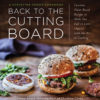![]() Marketing a book is a multifaceted process that encompasses everything from traditional media pitching and brand partnerships to Facebook ads and speaking engagements. In our new “Smart Marketing” series, the BenBella Marketing Department will share insights into hot topics in marketing and publicity and practical strategies authors can put into practice.
Marketing a book is a multifaceted process that encompasses everything from traditional media pitching and brand partnerships to Facebook ads and speaking engagements. In our new “Smart Marketing” series, the BenBella Marketing Department will share insights into hot topics in marketing and publicity and practical strategies authors can put into practice.

When you’re starting out on your publishing journey, it might feel like everything you read and hear about book marketing is in another language, especially if you don’t have a ton of media or marketing experience. Like any other field, the publishing industry uses a lot of jargon and can rely on multiple terms to describe the same concept.
This post serves as a glossary of terms the BenBella marketing team uses and references every day. We hope it clears some confusion and can serve as a helpful resource to define any foreign terms your agent, publisher’s marketing team, or publicist might use.
Advance review copy (ARC) or Galley: An early version of the book for media, influencers, and supporters to review before the final book is printed. We also equip the sales force at our distributor (Two Rivers) with these copies. ARCs/galleys are designed, typeset, and edited, but they have not been proofread. It will look like a paperback version of your book and will be clearly marked as such on the cover and interior with notes indicating it is not intended for sale but for media and rights purposes only.
BLAD: A sample of the designed interior of our four-color books, usually cookbooks, for the same advance review purposes as ARCs/galleys. BLAD stands for Book Layout and Design and they are usually around 36 pages.
Sales force: Team of salespeople at our distributor who sell our books to buyers at vendors, retailers, nontraditional accounts, etc. In marketing, we’ll ask you to keep us updated on your activity (media interviews, speaking engagements, etc.) before, during, and after publication so that we can best equip the sales force. These details help the sales force leverage meetings with buyers to get the best possible orders for your book.
Author platform: An author’s network cultivated through an author website, social media channels, an email list, speaking, corporate connections, etc. This can look different for every author, in both size, scope, and type, but these are the people who support your work and are most likely to purchase your book.
Different media types:
- Book trade: Media outlets that cover the book industry and write book reviews. Examples include Publishers Weekly, Kirkus Reviews, Booklist, etc. These publications require ARCs/galleys or BLADs four to six months before publication date in order to be considered for review.
- Long-lead: Glossy magazines or journals that require a longer lead time (four to six months) for stories and reviews. Examples include Real Simple, Discover, Prevention, Parenting, Wired, etc.
- Short-tier print: Weekly or daily print publications, typically newspapers, that work on shorter deadlines. Examples include The New York Times, The Wall Street Journal, Newsweek, etc.
- TV: Author’s local network affiliates, relevant national programs, or affiliates in a market the author is traveling to. Examples include KDFW, WFAA, KXAS, KTVT, “CBS This Morning,” etc.
- Radio: Local and syndicated shows on AM/FM stations that interview guests Examples include “All Things Considered,” “The Kim Komando Show,” “Coast to Coast AM,” etc.
- Podcasts: Online radio shows featuring long-form interviews. Examples include Stuff You Should Know, Radiolab, The Nerdist, Sword and Scale, etc.
- Blogs: Personal websites for writers and personalities in a specific niche or content area. Examples include Oh She Glows, Brazen Careerist, Copyblogger, Mashable, etc.
- Online outlets: Digital versions of traditional print or broadcast media. Examples include Slate.com, Billboard.com, NPR.org, NYTimes.com.
- Influencers: Individuals who have a large following in their particular format—social media, industry expert, sought-after speaker, etc., and who usually cover a niche subject (makeup reviews, business, vegan cooking). They can share information about your book with a larger audience than you might be able to alone.
If you come across any terms or expressions that you would like more clarification on, leave a comment, and we’ll add it here.







